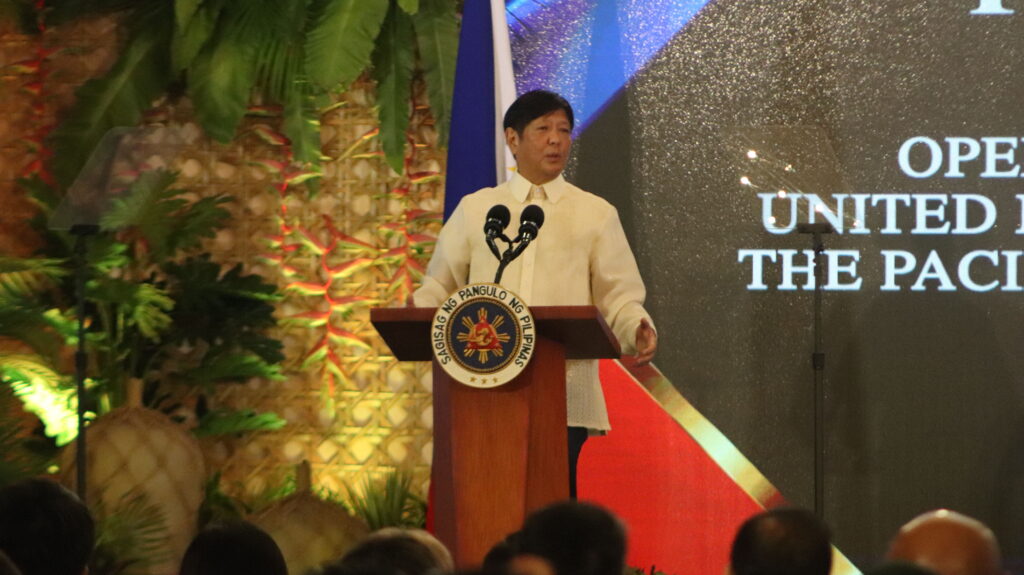
President Ferdinand Marcos Jr. delivers his keynote message at the 36th Joint Meeting of the UN Tourism Commission for East Asia and the Pacific and the UN Tourism Commission for South Asia on Friday, June 28. | CDN Photo/ Dave Cuizon
CEBU CITY, Philippines – A greener solution for sustainable tourism.
This was the central message of President Ferdinand Marcos Jr. in his keynote address at the 36th Joint Meeting of the UN Tourism Commission for East Asia and the Pacific and the UN Tourism Commission for South Asia on Friday, June 28.
Marcos highlighted the goal of adopting environmentally friendly practices to transform the tourism industry, tackling climate change, preserving resources, and ensuring sustainability.
“We must go green in the transformation of our tourism products and services as a solution to address climate change, resource preservation, and long-term industry sustainability,” he said.
READ MORE:
UN Tourism chief urges Cebu to build a ‘gastronomy center’
Marcos pushes for global ‘greener’ tourism initiatives
The event, which also hosted the First UN Tourism Regional Forum on Gastronomy Tourism for Asia and the Pacific, brought together key figures from around the world to discuss the future of tourism. Among them were the UN Tourism Secretary-General Zurab Pololikashvili; the Special Assistant to the President, Secretary Anton Lagdameo; and Deputy Speaker and Representative of the 5th District of Cebu, Congressman Duke Frasco.
Also in attendance were other honorable members, Cebu Governor Gwen Garcia, Lapu-Lapu City Mayor Junard “Ahong” Chan, and Cebu City Acting Mayor Raymond Alvin Garcia.
President Marcos Jr. pointed to the country’s commitment to green transformation. He detailed the initiatives such as easing visa access, improving water sanitation, and enhancing connectivity through better airport infrastructure.
“We are also working with the private sector to pursue reforms that will make tourists ‘visit, stay, spend, and return’ to the Philippines,” he said.
He added, “By adopting these practices, we create a tourism industry that not only creates responsible visitors but also uplifts the lives of those who are part of that activity.”
READ MORE:
Marcos eyeing stronger PH-New Zealand tourism partnership
PH tourism slowest to recover in Asia-Pacific region
He expressed optimism that the meeting would foster collaboration and the sharing of best practices, particularly in education and sustainable tourism.
“We need to raise the standards and practices in this crucial sector by investing in education, training, and skills upgrading of all the personnel who are working in this industry,” Marcos said.
Moreover, the president mentioned the impressive growth of the Philippine tourism sector. He noted that in 2023, tourism contributed 8.6 percent to the country’s gross domestic product (GDP), which amounted to approximately 35 billion dollars.
According to Marcos, the country welcomed 5.45 million international tourists, which surpassed its target of 4.8 million.
“But going beyond monetary values and numbers, these figures also mean millions of lives being changed for the better. And that’s why I hope that our efforts here will lead to even better practices [and] more tourism arrivals not just for our country but for the entire world,” he said.
Marcos further noted that sustainable tourism was both an environmental imperative and a pathway to economic prosperity and cultural preservation.
He called on all delegates and stakeholders to contribute to the success of the gathering, celebrating cultural diversity and building a greener future for tourism in Asia, the Pacific, and the world.
The 36th CAP-CSA and the First UN Tourism Regional Forum on Gastronomy Tourism for Asia and the Pacific took place from June 26 to 28, 2024. The event was attended by more than 600 participants.

